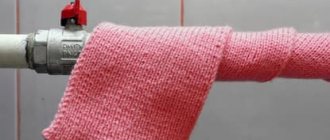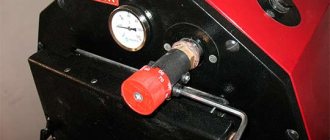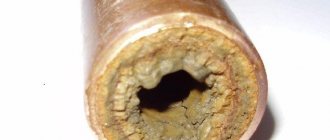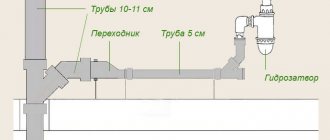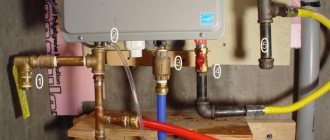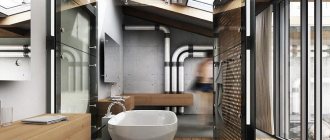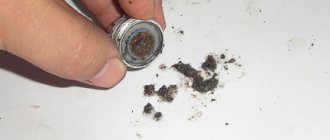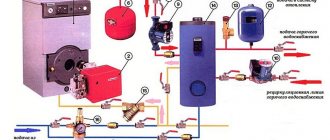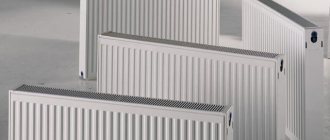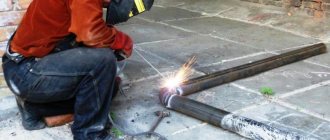Hiss and whistles
If the radiator hiss or whistles, this is a sign of a water leak. Moreover, the leak can be anywhere in the heating system. Sometimes water comes out in a heating pipe embedded in the wall, and the sound comes from a radiator 10 meters away from it.
If you live in a multi-storey building and have not found an obvious leak in your apartment, talk to your neighbors. Maybe somewhere in a secluded corner they already have a puddle. If an obvious place is not found, you should check:
- Parts of pipes embedded in ceilings and walls;
- Common riser;
- Places where the riser passes through the floors.
Heating System Prevention Tips
To prevent heating an apartment, it is necessary to flush the heating radiator so that the water circulates freely. Plaque with a thickness of 7-8 mm forms in 5-8 years and reduces the efficiency of the system by up to 30%. Over time, suspended solids and debris in the radiator or riser will lead to a breakthrough. It is a mistake to believe that plastic pipes guarantee complete protection against these factors. It is important to select a suitable flushing method. For example, the chemical method cannot be applied to aluminum radiators and leaky systems.
Flushing of the heating system in an apartment building with centralized heating is carried out by the ZhEK employees, residents are notified of the upcoming work in advance.
You can flush the radiators in your apartment yourself. This is done before the start of the heating season by contacting the heat supply organization to drain the water from the system.
Owners of an autonomous heating system wash radiators at their own expense. In addition, they need to inspect the boiler, check the pressure in a closed heating system, and check the water level in the expansion barrel in an open one. Preventive maintenance does not require any special skills or special tools.
Did you find the information you need about eliminating battery noise?
Murmur, rustle. Gurgling, the sound of pouring water in the battery
When such sounds appear, the reasons may be as follows:
- The appearance of an airlock;
- Littering of the heating system;
- Deteriorated gaskets.
Airing the heating system - the most common problem of the appearance of extraneous sounds in the system. Air can appear due to poor water or heat transfer fluid quality. This is especially true for aluminum radiators. Highly acidic and alkaline water reacts with metal and produces gas, which creates a plug.
The second reason for the appearance of air is a poor-quality coolant. Over time, it can begin to break down and release oxygen or other gases (sometimes hazardous to health).
It is not difficult to find an airlock in the radiator. It is enough to touch it with your hand from above and below. If the battery is less hot in the upper part, air or gas has accumulated there.
If a Mayevsky tap is installed on the batteries, bleed the air from each individual radiator. Then wait 15-20 minutes and repeat the process. If there is no Mayevsky crane, the process will become more complicated. Read more about this in the article "How to properly bleed air from a heating battery with your own hands."
Why is there noise?
In most cases, noise occurs in the system and is transmitted to the radiator, regardless of its material of manufacture. The main reasons for its appearance:
- high speed of water movement (often observed in one-pipe systems);
- airiness;
- poor-quality fastening of the radiator;
- system resonance due to pump vibration.
Noises caused by a malfunctioning radiator are rare.Apartment owners who do not take action when sounds appear in the system act rashly, since timely diagnostics can prevent pipe breaks.
Hiss and whistles
A hissing radiator is a warning sign that can mean the following:
- depressurization of the joint;
- the appearance of a fistula or fissure.
The hiss can be heard within a radius of 10 m and in most cases is accompanied by water leakage. At first, the amount is small.
The reasons for whistling can be associated with risers:
- if the wrong pipe diameter is selected, for example, when connecting plastic and metal pipes that do not match in diameter;
- if the riser taps are clogged or tightened.
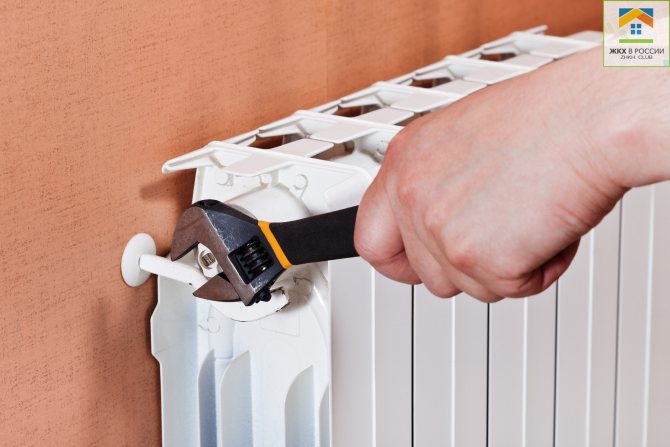
Murmur and gurgle
The reason for the murmur of water may be a torn off valve valve, and in an autonomous system - an incorrectly selected boiler. Water gurgles in such cases:
- with an excessive amount of air in the system;
- when water moves along curved bending sections.
Murmuring water in the heating pipes is a sign of a decrease in the efficiency of the system.
The air lock prevents the free movement of the coolant, and the pipes heat up unevenly.
Clicks and knocks
In most cases, clicks and knocks during heating and cooling are normal for heating systems made of metal.
Sounds are associated with the movement of pipes - expansion when heated and contracted when cooled. This knocking resembles a blow to metal.
The radiator knocks when, when the metal is heated, there is no room for expansion:
- if the pipe section in the wall is not equipped with a special sleeve;
- if pipes are installed under rigid, not sliding supports;
- if, for aesthetic purposes, the pipes are laid in the grooves of the wall and ceiling slabs and are filled with cement.
Clicks, knocks when heating and cooling
Sometimes extraneous sounds occur when the batteries begin to heat up or cool down. This is due to the fact that they do it unevenly. The metal expands when heated and contracts when cooled.
In this case, you need to lay gaskets between the brackets on which the battery is attached to the wall or floor and the radiator itself. These can be ordinary pieces of rubber with a thickness of 2-3 mm.
Important!
If you have cheap bimetallic radiators, extraneous sounds may occur due to their internal structure. The design of bimetallic radiators differs from the rest - they use two metals. If they do not fit snugly together, you will hear clicks when expanding.
Causes of knocking and noise in batteries
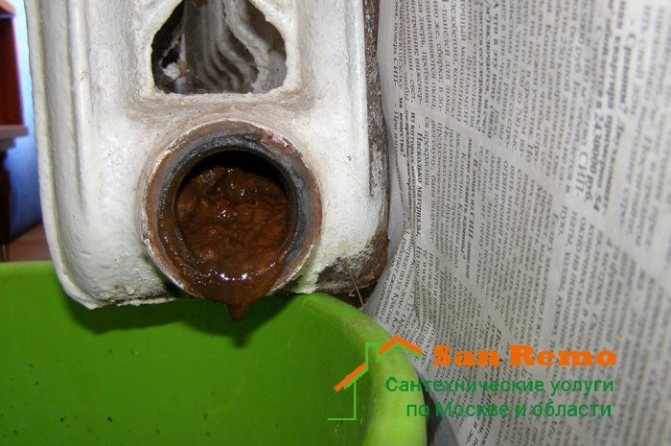

What causes metallic knocks, squeaks and scrapes from the radiators? This is usually caused by one of two reasons:
- The first case is less likely and is associated with insufficiently reliable fastening of the radiator to the wall. If you have just moved into an apartment or have recently replaced the heating in your house, the installer may have poorly secured the radiator or used the wrong brackets. Also, the fasteners can simply come loose. Try substituting gaskets where the radiator contacts the brackets.
- The second option is associated with the fact that suspended particles circulate in open heating systems, which are not captured by filters. When they hit the radiators and are supplemented with rusty flakes, they cause knocking sounds. Often these extraneous inclusions are retained inside the heating radiator. In this case, the problem cannot be solved without disconnecting and cleaning the battery.
When calling the master online
There are several ways to clean a heating radiator, but they are all divided into chemical and mechanical. In the first case, a special agent is poured inside that corrodes dirt, and then the liquid is drained and the radiator is operated further. During mechanical cleaning, the radiator is washed with a powerful jet of water, which flushes out all the dirt from the inside.
Noise, hum, hum, extraneous sounds
There are many reasons for constant noise in heating radiators. Let's break them down in order:
Wrong pipe diameter
Sometimes heating pipes are of different diameters and are connected with adapters. Because of this, a pressure drop occurs and turbulences appear in the water or coolant. They lead to vibration and extraneous sounds.
Often, a change in diameter occurs due to clogged pipes. Deposits can build up on their inner walls. This leads to a decrease in bandwidth.
The only way to solve the problem is to cut the old pipes and install new ones.
Pressure drops
Vibration can occur due to pressure surges in the heating system. The reason for this is the uneven operation of the circulation pump.
If you live in an apartment building, you can install a bypass. It will help compensate for pressure drops. But it is best to contact the utilities.
If you have your own heating system, diagnose and prevent the circulation pump. And best of all, call a specialist. This can be done using service for the selection of private specialists PROFI.RU.
What to do if there is noise?
You can diagnose the operation of the heating system yourself. To do this, you need to find out the following:
- source of sounds;
- how often do they arise;
- how pressure drops and temperature changes affect their appearance;
- whether vibration appears simultaneously with the sounds.
With hissing and whistling sounds, there is a high probability of a fistula, so you need to find out if there is moisture on the pipes and the battery. If a fistula is detected, it is necessary to install a clamp or replace a section, and if the radiator is old, change it completely. The service life of radiators depends on the material from which they are made:
- steel - 15-20 years;
- aluminum - up to 25 years;
- bimetallic - 25-30 years;
- cast iron - up to 35 years.
To get rid of the airlock, you need to stop the autonomous heating. Air is released through a device intended for this (float automatic system, Mayevsky tap, plug or water tap), depending on the type of radiator, when the water temperature in the system drops to + 25 ... + 30 ° C. Air comes out for 1-2 minutes. The most difficult thing is to air the cast-iron radiator, since the plug in it is fixed with tow and paint.
If sounds have caused faulty components, such as a torn off valve valve or air vent, they must be replaced. If the whistling sounds are accompanied by vibration, it is necessary to additionally secure the pipes.
If the owner does not have the skills and the necessary tools, it will be difficult for him to fix the problems on his own, and it is better to turn to specialists. They will make a detour of the neighboring apartments, check the entire riser and go down to the basement. In the event of a break in the ventilation valve, a call to the master is mandatory.
An experienced specialist can quickly determine the cause of the noise by the type of noise, and in difficult cases find it by sequentially going through the options.
Sounds of bubbling and clicks are heard
What to do if such noises appear and what caused it? Most likely, solid particles of debris or some elements of communications have accumulated in the pipes. Even if soundproofing is installed, you will still hear the pipes buzzing, since the noise will spread over some and rather long distance.
If air enters the system, then simultaneously with the appearance of strange sounds (gurgling, whistling, etc.), the temperature of the radiators will decrease, since it will not allow the coolant to move smoothly through the system. Therefore, on the last floors of a high-rise building or in a private house, a Mayevsky crane is installed, designed to discharge the so-called excess air.
Let's see how to fix this problem and what needs to be done in such a situation.First, you need to go to the neighbors and try to bleed air from the system using this device (Mayevsky's tap). If this does not help, then they are looking for a skew, that is, the place of incorrect installation of the pipe to the battery, since because of this, not only the heating riser, but all pipes can make noise.
If you hear a crackling sound from the system, water gurgles and whistles something, then this may mean:
- the ventilation valve has broken;
- debris or worn parts of parts appeared in pipes or batteries;
- due to the unstable operation of the radiators, the metal has expanded.
If the ventilation valve breaks, they must call a specialist, because only he can fix such a problem. During the operation of the heating system, hot water moves, and if there is slag or debris in it, then crackling and clicks are heard. This is eliminated by connecting the hose to the tap. Then the water is opened and everything is drained into the sewer.
If, as a result of the temperature drop, the metal has changed its shape, then extraneous noise also appears. And if the pipes are attached with brackets, then weak fasteners can cause knocking.
Indeed, when the temperature drops, the bracket begins to move and knock on the pipes, so it is simply pressed more tightly against the wall.
There are many reasons why you can hear strange sounds when the heating system is operating, but the question should no longer arise - why are radiators or pipes making noise? It is possible to eliminate this on our own, however, this requires appropriate experience and skill, and if there is none, then specialists are called in. They will fix everything efficiently and in a short time.
And so that such problems no longer arise, you can switch to alternative heating, for example, using a gas stove, but then a large payment will come. So when clicks, bubbling, knocking, etc. appear in the heating system, it is better to call a plumber.
Types of sounds and possible causes of their appearance
Extraneous sounds can occur anywhere in the heating system - in a riser or radiator, heat exchanger, circulation pump and other equipment located in technical rooms.
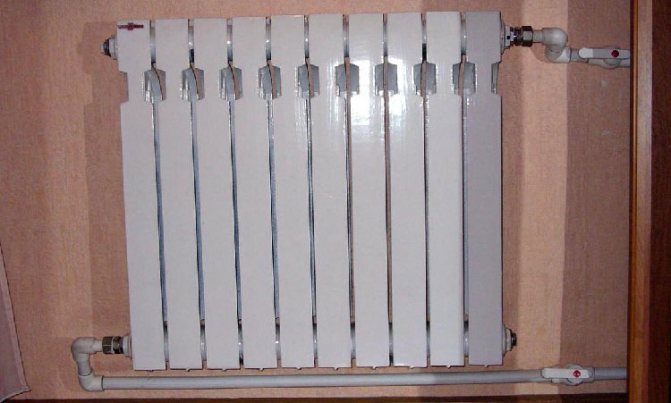

Since most modern houses have metal round pipes through which water circulates, then, according to the laws of physics, sound waves in the system can propagate quickly and over long distances. Often, the cause of the acoustic effect in the system can be located in the neighbors' apartment below or above the riser, and even in the basement / attic.
Pipes and radiators in a home can make various noises:
- hum - a sound reminiscent of the hum of a transformer or an airplane flying in the distance;
- knocking - different in volume and frequency (these can be constant evenly tapping sounds or periodically arising sounds of beats);
- gurgling and gurgling of water.
Violations of the rules for operating the system by residents can also cause noise. For example, if the owners of one of the apartments put a working electrical appliance next to the riser, which contradicts the rules of operation, then the vibration from it can lead to an acoustic effect in the heating pipes.
We recommend that you familiarize yourself with: Installing welded fences and fences from a profile pipe with your own hands
Causes of hum in pipes
Constant hum in pipes, reminiscent of the distant sound of an airplane flying or the hum of an electric transformer, usually occurs due to a disruption in the process of water flow. This may be a leak when a hole has arisen in one of the sections of the pipeline, from which a stream of hot water gushes.
The appearance of the sound effect in this case is explained by a simple law of physics, when an intense flow of particles through a relatively small hole causes an increase in pressure and the appearance of a specific sound. The sound wave is transmitted by metal pipes and water coolant and is well felt by the residents.
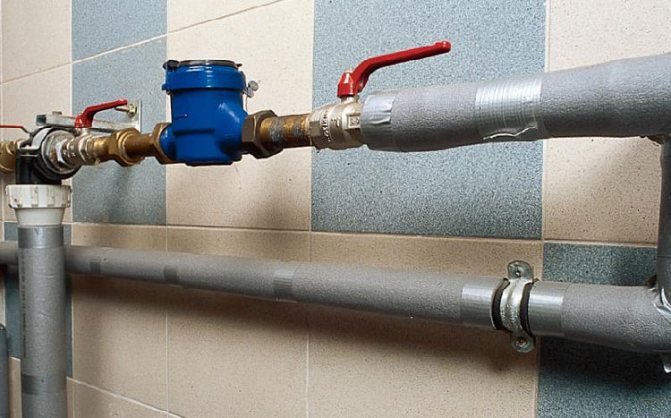

Another reason for the appearance of a hum is a narrowing of the lumen of pipes in one of the sections of the system or a decrease in their patency. The pipes can be narrowed due to the formation of scale deposits, which occurs due to the increased concentration of salts of hardness of the water.When passing through a narrowed area, water creates the same acoustic effect as a leak. Sometimes the same phenomenon occurs when one of the neighbors in the riser changed the pipes for new ones, and their diameter turned out to be smaller than the standard ones.
Often, co-owners of apartment buildings hear a characteristic booming sound in pipes during the transition season, when utilities drain water from the system in preparation for winter or when water is put into the system and the start of hydraulic tests.
Why is there a knock on pipes?
Heating pipes can knock - constantly or periodically. This phenomenon is usually associated with:
- the presence of particles of debris, rust, scale in the riser or batteries;
- malfunction of shut-off valves;
- thermal expansion of metal reinforcement.
Debris particles are often the cause of knocking and grinding noise in heating systems, especially those that are old and worn out. There is usually a thick layer of scale on the inside of old heating pipes.
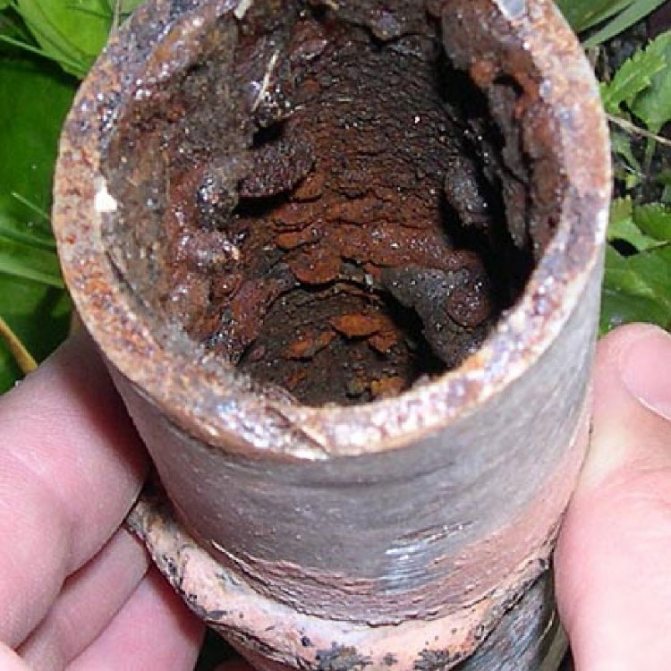

Under the influence of water pressure and high temperature, scale particles can break off and get stuck in one of the radiator sections or at the turn of the pipeline. With a constant flow of water, a piece of scale will hit the walls of the pipes, making a knock.
Attention! Rarely enough, faulty fittings, for example, a valve valve, become the cause of tapping in pipes. It can partially or completely come off and dangle in one of the sections of the system under the influence of a water jet.
The last known cause of pipe knocking is thermal expansion. We know from physics lessons that metal can expand and contract under the influence of temperature. As it heats up, its surface area becomes larger, which leads to an increase in the length of the pipeline by an average of 2 cm.
We recommend that you familiarize yourself with: Do-it-yourself gazebo from a profile pipe
During cooling, the reverse process occurs when the pipes are compressed to their original size. In this case, a knock occurs when there is an obstacle in the path of the pipe, or the pipe itself was installed unprofessionally (for example, it was fixedly attached to the wall at the turning section).
Temperature changes in pipes, as a result of which they constantly expand and contract, indicate a malfunction or unprofessional installation of the pipeline. Incorrect operation of the circulation pump, airing, pressure drop in the system lead to a decrease in heating efficiency when the coolant does not warm up all sections of the pipeline. In this case, you need to contact a specialist who will check the system as a whole.
Causes of water gurgling
A bubbling is an indication of the presence of air in the system. It can get there in various ways: through holes, cracks and holes in pipes or depressurization of coupling joints. Sometimes oxygen circulates in the system together with water, which is formed even with a closed sealed circuit as a result of the oxidation of ferrous iron. In this case, gas bubbles will gurgle.
The murmur and gurgle in the pipes
Quite often, gurgling and gurgling can be heard in the pipes. As a rule, these sounds are typical at the beginning of the heating season when the system is filled with water.
If these sounds are not a consequence of starting hot water, then they may indicate the appearance of the following problem: an obstacle has arisen inside the radiator and the coolant has to flow around it, which is why these sounds are heard.
In order to determine the cause, it is necessary to make sure the position of the valve and its operability, and also try to establish the presence of a blockage. For prevention, it is recommended to clean the system; this can be done by the following methods:
- With the help of a powerful pressure of water.
- With the use of special chemicals with further flushing of the system with a jet of water under pressure.
If these measures are ineffective, it is worth contacting a specialist for help, since in case of a serious blockage, you will need to seek help from a welder.
Noise in pipes in case of equipment malfunction
The reason for the noise may not necessarily be in the heating radiators; other structural elements can also be the cause of various noises.
- Riser. Occasionally, noise in the radiator is the cause of water leakage from the riser. This problem should be immediately resolved on its own, or with the help of a specialist who can be called from the housing department.
- Water pump. The hum of this device is due to a number of factors:
- the installation of the pump was carried out with defects;
- the power of the device does not meet the standards;
- it is necessary to replace the adjusting washers;
- when the pump is running, overheating is allowed;
- wear of individual units of the device or the entire structure.
In order to diagnose the pump, it must be disassembled, for this it is better to seek the help of a specialist.
3. Heating boiler. Extraneous noise may occur if this unit does not operate properly. Features of sounds and the possibility of eliminating them in most cases depend on the fuel on which the boiler operates:
For solid fuel models, crackling in the chimney is most typical. To solve this problem, you just need to clean the chimney, then turn on the device at full power.
In gas boilers, the most common cause of noise is burner defects, so this element just needs to be replaced.
Diesel boilers often emit a whistle that appears in the nozzle due to excess soot that interferes with heat transfer. Installing a thermostat will solve this problem and allow you to get the job done.
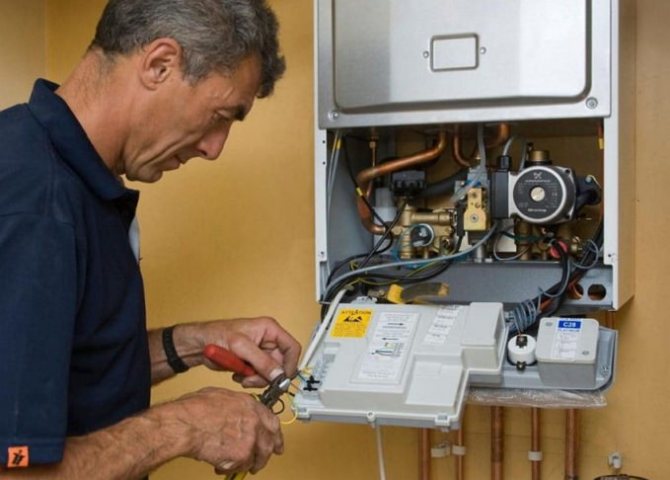

The reason for the appearance of noises in the pipes may also be associated with a break in the control valve. In this case, it is necessary to immediately call a specialist, since blocking the movement of the liquid by the detached element can cause a rupture of the heating sections.
The noise can also come from a gas water heater or an electric heater. First of all, it is necessary to inspect the valve of these devices, which in most cases is the cause of the malfunction.
Tips for preventing noise from individual heating systems
Extraneous sounds in the heating circuits interfere with comfortable living and the presence of residents in the premises, and may cause the expenditure of additional financial resources to eliminate them. Therefore, when arranging a heating main in an individual house, it is worth adhering to the following basic recommendations:
- The heating pipeline must have the same diameter of the passage channel along its entire length, in addition to reducing hydraulic losses and increasing the efficiency of the system, this will significantly reduce the noise of the coolant in the circuit.
- When installing the line, avoid excessive turns and branching, which can lead to hydraulic losses and increased noise.
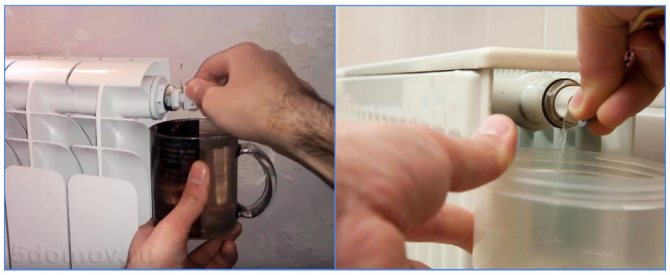

Bleeding heating radiators
Fig. 5 Bleeding radiators
- It is not recommended to use polypropylene pipes without a reinforcing layer of aluminum or fiberglass in heating systems. In addition to low temperature resistance, they have a high coefficient of thermal linear expansion, which contributes to the movement of their shell and the appearance of noise.
- If metal-plastic pipes are used to lay the heating main, they are bent using a special pipe bender, which ensures a constant cross-section of the passage channel.
- For the installation of polypropylene, you should hire qualified specialists with high soldering skills - this will avoid excessive narrowing of the passage channel when pipes are overheated or a violation of the sealing of the joints with insufficient heating of the parts to be joined.
- When purchasing shut-off ball valves, choose from two types - reduced with a reduced cross-section of the passage channel and full bore. To reduce water loss and the likelihood of noise, you should choose the second type of shut-off valves.
- All shut-off and control valves, the circulation electric pump should be installed according to the arrows indicating the direction of the flow of the heat carrier.
- When choosing an electric pump, its power must correspond to the heating circuit, that is, the operating parameters of the system must be maintained at the average reading of the three-speed speed switch.
- When installing radiators, their strictly horizontal arrangement should be observed; in gravity systems, they must withstand the required angle of inclination of the pipes.
- To prevent the appearance of scale and other deposits in the heating circuit and the boiler, they are periodically flushed with appropriate chemical reagents that dissolve the sediment. The work should be carried out at the end of the heating season - this will allow flushing the system for a long period of time (the liquid can be left in the circuit for several days) and, accordingly, increase the efficiency of cleaning the pipeline and boiler.
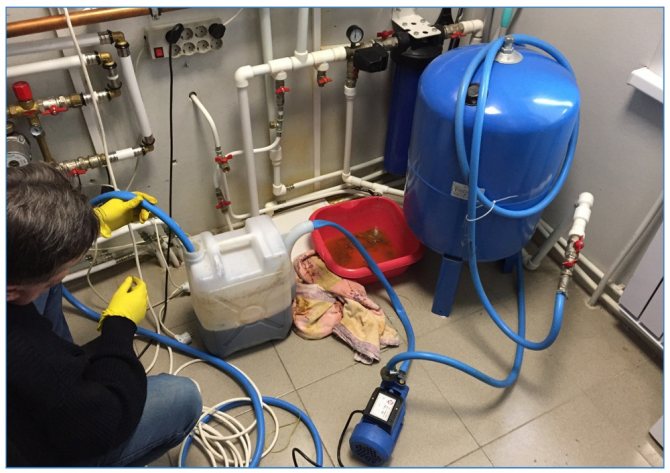

Fig. 6 Flushing the heating system
Radiator clicks and knocks: causes of crackling, knocking and clicking
Specific sounds in the heating system are generated by the presence of foreign particles. Many reject this possibility, since in a private house the heating circuit is looped, it is a closed system with a small turnover of the coolant. But the appearance of debris in the batteries, due to which they knock, is a cumulative phenomenon.
The water used in heating does not pass through filters, but is taken from a regular water supply. With constant heating, metal salts settle on the walls of pipes and batteries, forming scale.
Breaking off under the pressure of water, the particles move from place to place, they seem to click.
For a private house, it is much easier to eliminate the problem of crackling, knocking and clicking in the battery than for an apartment building. Almost any owner can do it on their own. The coolant is discharged into the sewer through the throughput valve. The heating circuit and adjoining communications are flushed with clean water. Then the coolant is replenished.
If the valve malfunctions, a simple replacement of the obsolete element is sufficient.

